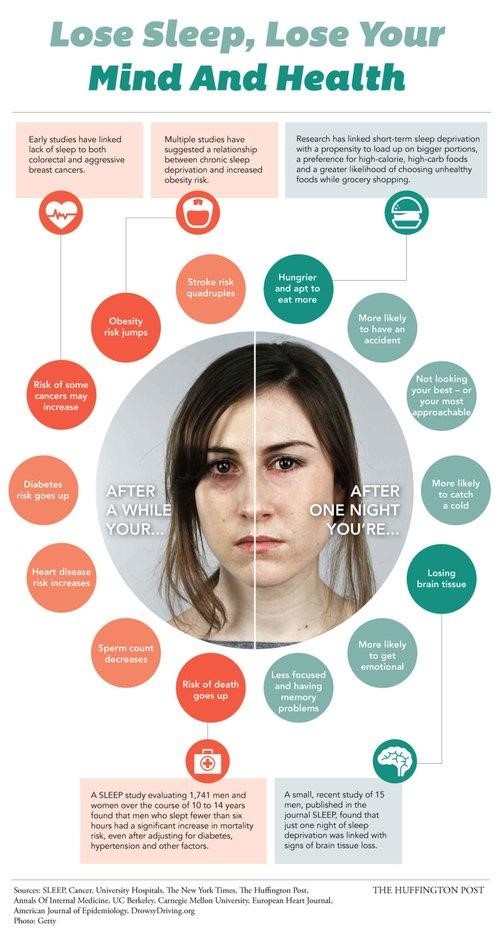In this article, the health impact of when you don’t sleep for days is explored: Find out what happens to you cognitively, physically, mentally and hormonally
You surely know that sleep deprivation isn’t always voluntary.
But did you know that even a single night without your usual shut-eye can significantly affect your well-being? Let alone spending more than 24 hours without sleep.
So, what exactly will happen to your body when you don’t sleep for days?
Here’s the answer.
Cognitive Issues
Our brain depends on proper sleep. Not only because it helps us perform better at work but also because of the glymphatic pathway, which flushes out the toxins and byproducts that have accumulated during the day. This pathway opens up only while we are sleeping.
So, it’s no surprise that our brain will be the first one to suffer even after a single sleepless night.
24 hours: Brain fog
Although it isn’t a medical condition, brain fog is still quite unpleasant. The most common symptoms of it are the inability to focus or put your thoughts into words, feeling of disorientation, deterioration of the decision-making behavior and struggle to remember things.
36 hours: Decreased intellectual performance
If you continue to stay awake for 12 hours more, your overall performance will drop significantly. You can find yourself unable to generate ideas or follow the instructions that are given to you, and even simple tasks will require an eternity of time to process. Your reaction time will slow down too, and this is where sleep deprivation can become dangerous — for example, if you decide to drive home on your own. According to different studies, as many as 20% of all car accidents in the USA occur because of drowsy driving.
48 hours and more: Memory impairment
After another wide-awake night, your memory problems will get worse. Some studies report that proper sleep is responsible for forming both procedural memory (ability to repeat remembered tasks) and declarative memory (memorization of your experience or facts). Along with that, your shut-eye time helps turn the short-term memories into the long-term ones, while the lack of sleep does the opposite.
“People who work in health care, transportation, network administration and other fields that involve irregular schedule and night shifts are more prone to developing chronic sleep deprivation.”
Physical Stress
Our body is the next one to take the heat. Most common physical symptoms of sleep deprivation are the following:
24 hours: Daytime sleepiness
This is the primal thing you’ll experience after skipping the sleep even for 12 hours. That’s because during sleep our body restores the glycogen deposits in the liver and in the muscle tissue. By staying awake for 12 hours and longer, you deprive your body of this possibility, and daytime sleepiness is your body’s response to this.
36 hours: Immune suppression
Some studies show that the lack of sleep can quadruple the risk of catching a flu or common cold. The thing is, if you’re sleep-deprived, your body temperature lowers, making you an easy target for viruses and germs. Moreover, specific proteins called cytokines are produced during sleep. Cytokines are responsible for fighting inflammation, so if you’re not getting enough shut-eye, you’re probably lacking them in your blood, which, again, contributes to immune suppression.
48 hours and more: Increased cardiovascular risks
Inflammation triggered by lack of sleep can also affect your heart. According to the American Heart Association, adults who sleep 6 hours or less are at the most risk of developing chronic hypertension and coronary artery disease.
“Another way your body signals that it needs sleep is microsleep episodes. Microsleep is a short-term knock-out, basically for seconds, but it can become hazardous while you’re driving or doing the work that requires precise attention and fast reaction.”
Hormonal Imbalance

Our endocrine system works as a very fragile clock. And insufficient sleep can imbalance that clock very easily.
24 hours: Stress
Poor sleep increases the level of cortisol in your blood. This makes your body experience constant anxiety and stress. Along with that, cortisol also triggers inflammation and breaks down collagen fibers in your skin. So, if you often stay awake ‘til sunrise, be prepared for a dull and wrinkly face.
36 hours: Impulsive eating behavior
Your hunger and satiety cycles are controlled by hormones too. The lack of sleep disrupts the balance between ghrelin and leptin levels, making you an impulsive eater. Also, the lack of energy due to the sleep loss results in looking for carbohydrate dense food: sweets and bakery products.
48 hours: Diminished libido
Now, while sex can actually help you improve your sleep, long-term sleep deprivation will make you unwilling to dive in a bed of love. And that’s a fact. Studies conducted on sleep-deprived men showed that after a week of poor sleep (5 hours or less) testosterone levels in their blood decreased by 10-15%.
“Sleep deprivation also increases the risk of diabetes, obesity, and thyroid disorders.”
Mental Health Problems
Disrupted sleep patterns or complete lack of sleep can affect the neurotransmitters production in your brain, which, in turn, may trigger certain mental disorders.
That’s why you should try not to neglect proper rest.
24 hours: Anger tantrums and irritability
One sleepless night makes you less able to withstand adequate criticism and increases antagonizing behavior. This is not good if you’re a leader. Studies conducted on team leaders and managers showed that the boss’ poor sleep may affect the motivation levels of the whole team.
36 hours: Depressive thoughts
Recent studies claim that chronic insomnia may be one of the depression causes. 50 to 80% of people who seek mental help report having chronic difficulties with falling and staying asleep. But you can actually experience depressive and even suicidal thoughts after a one utterly sleepless night. See, the REM-stage — which is one of two large stages of your sleep — is responsible for your abilities in terms of emotional processing and relaxing. If your sleep is somehow disrupted, these abilities suffer too.
48 hours: Hallucinations and paranoia
If you continue to stay awake for 2 days and more, you will experience the symptoms similar to an acute schizophrenic episode, e.g. hallucinations, hostility, and paranoid thoughts. One study found that almost 2% of 350 sleep-deprived people developed a strong feeling of persecution and xenophobia.












I’ve been awake for 3 days due to a handicap ♿️ space issue.